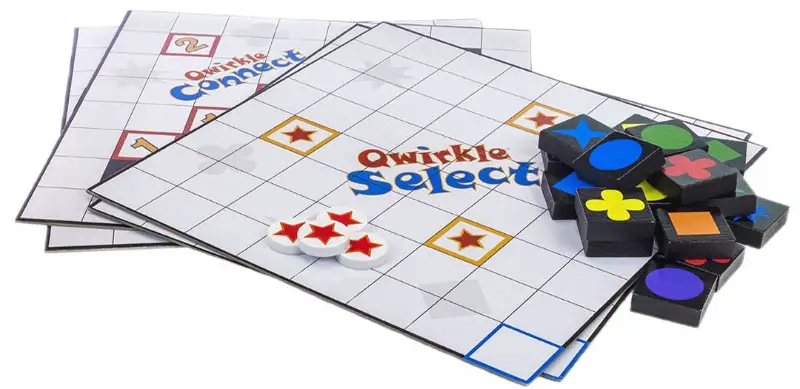

You would typically do this to activate additional rows, and thus you would be able to score all rows that were added to. What I mean by this is that let’s say there is already a yellow square on the table - it would be possible (for whatever reason) to place a yellow circle before it and a yellow star after it. Players can place tiles in a straight line including before and after a break - which is quite different to Scrabble and does take some time to get your head around. The stipulation when placing a tile is the same as I’ve just described above - no horizontal or vertical line may contain more than one symbol of each colour, and so the maximum length of a line will be six - either six of the same symbol but in different colours, or six tiles of the same colour, all with different symbols. On each turn that follows, the players will place one or more tiles adjacent to those existing, or they will return a number of tiles to the bag and draw the same number back out again. That player will then score one point for each tile placed and draw themselves back up to six tiles. For example, this might be three different yellow symbols, or a run of three circles made up of any three different colours. The player who declares the highest opening move (a run of either identical coloured pieces with no matching symbols, or a run of different coloured but matching symbols) will start the game. Tiles are printed with six different patterns and in six different colours, with three tiles showing each pattern of each colour (three blue stars, three yellow circles, etc). During setup, the players each draw six tiles and place them upright in front of them (to keep them secret). Qwirkle consists of nothing but a bag, a brief instruction booklet and 108 wooden tiles which go into the bag.

However, without getting into a slanging match, those games all have their weaknesses, and something like Qwirkle might just offer an equally accessible, abstract experience without any of the arguments that come with those classics. When it comes to family games, most people know and reach for the classics - those games like Monopoly or Scrabble that almost anyone over the age of twenty will know well enough to play without being taught.


 0 kommentar(er)
0 kommentar(er)
